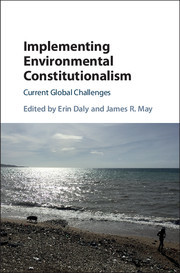Description
Implementing Environmental Constitutionalism
Current Global Challenges
Coordinators: Daly Erin, May James R.
This book examines how constitutional laws aimed at protecting the environment are being implemented and applied throughout the world.
Language: English
Subject for Implementing Environmental Constitutionalism:
Publication date: 11-2018
248 p. · 15.6x23.5 cm · Hardback
248 p. · 15.6x23.5 cm · Hardback
Description
/li>Contents
/li>Biography
/li>
Constitutions can play a central role in responding to environmental challenges, such as pollution, biodiversity loss, lack of drinking water, and climate change. The vast majority of people on earth live under constitutional systems that protect the environment or recognize environmental rights. Such environmental constitutionalism, however, falls short without effective implementation by policymakers, advocates and jurists. Implementing Environmental Constitutionalism: Current Global Challenges explains and explores this 'implementation gap'. This collection is both broad and deep. While some of the essays analyze crosscutting themes, such as climate change and the need for rule of law that affect the implementation of environmental constitutionalism throughout the world, others delve deeply into geographically contextual experiences for lessons about how constitutional environmental law might be more effectively implemented. This volume informs global conversations about whether and how environmental constitutionalism can be made more effective to protect the natural environment.
Foreword: filling the implementation gap in environmental constitutionalism Justice Antonio Herman Benjamin; Introduction: implementing environmental constitutionalism Erin Daly and James R. May; 1. Six constitutional elements for the implementation of environmental constitutionalism in the Anthropocene Louis J. Kotzé; 2. Implementing substantive constitutional environmental rights: a quantitative assessment of current practices using benchmark rankings Chris Jeffords and Joshua C. Gellers; 3. Implementing constitutional environmental rights in the Amazon rainforest Maria Antonia Tigre; 4. Climate change and environmental constitutionalism: a reflection on domestic challenges and possibilities Ademola Oluborode Jegede; 5. Natural resources, powersharing, and peacebuilding in post-conflict constitutions Carl Bruch, Aleksandra Egorova, Katie Meehan and Yousef Bugaighis; 6. Implementing environmental constitutionalism in Brazil Marcelo Buzaglo Dantas; 7. Judicial implementation of environmental constitutionalism in France: a fertile ground from the charter of the environment Jochen H. Sohnle; 8. The procedural right of access to information as a means of implementing environmental constitutionalism in South Africa Melanie Murcott; 9. Challenges and opportunities for the implementation of environmental constitutionalism in Nigeria Ngozi Finette Stewart; 10. Implementing environmental constitutionalism in Colombia: tensions between public policy and decisions of the constitutional court Ana Lucía Maya Aguirre; 11. Listening to the silence: implementing constitutional environmentalism in the United States Irma S. Russell.
Erin Daly is Professor of Law at Delaware Law School. She serves as the Director of the Global Network for Human Rights and the Environment, as the US National Correspondent for the Centre international de droit comparé de l'environnement (CIDCE), and as the Vice President for Institutional Development at the UNIFA in Haiti. She is the author of Dignity Rights: Courts, Constitutions, and the Worth of the Human Person (2013), and along with James R. May is the co-founder of the Dignity Rights Project and co-author or co-editor of Judicial Handbook on Environmental Constitutionalism (2017), New Frontiers in Global Environmental Constitutionalism (2017), Global Environmental Constitutionalism (Cambridge, 2015), and Environmental Constitutionalism (2014).
James R. May is Distinguished Professor of Law at Delaware Law School, and former Chief Sustainability Officer at Widener University, Pennsylvania. May is the editor of Principles of Constitutional Environmental Law (2013), and co-editor of Shale Gas and the Future of Energy (2016) and Standards of Environmental Constitutionalism (Cambridge, forthcoming) and along with Erin Daly is co-author or editor of various works on environmental constitutionalism, co-director of the Dignity Rights Project, and co-director of the Environmental Rights Institute at Delaware Law School.
James R. May is Distinguished Professor of Law at Delaware Law School, and former Chief Sustainability Officer at Widener University, Pennsylvania. May is the editor of Principles of Constitutional Environmental Law (2013), and co-editor of Shale Gas and the Future of Energy (2016) and Standards of Environmental Constitutionalism (Cambridge, forthcoming) and along with Erin Daly is co-author or editor of various works on environmental constitutionalism, co-director of the Dignity Rights Project, and co-director of the Environmental Rights Institute at Delaware Law School.
© 2024 LAVOISIER S.A.S.




